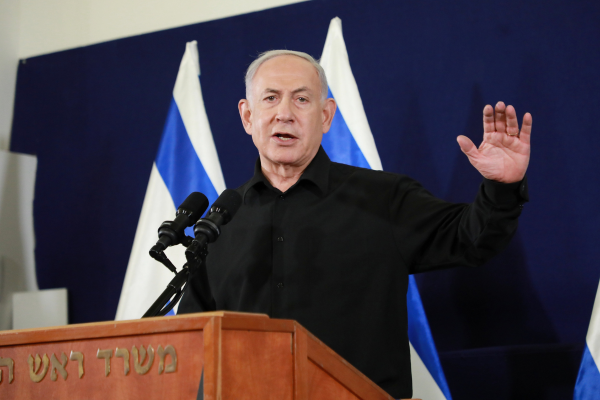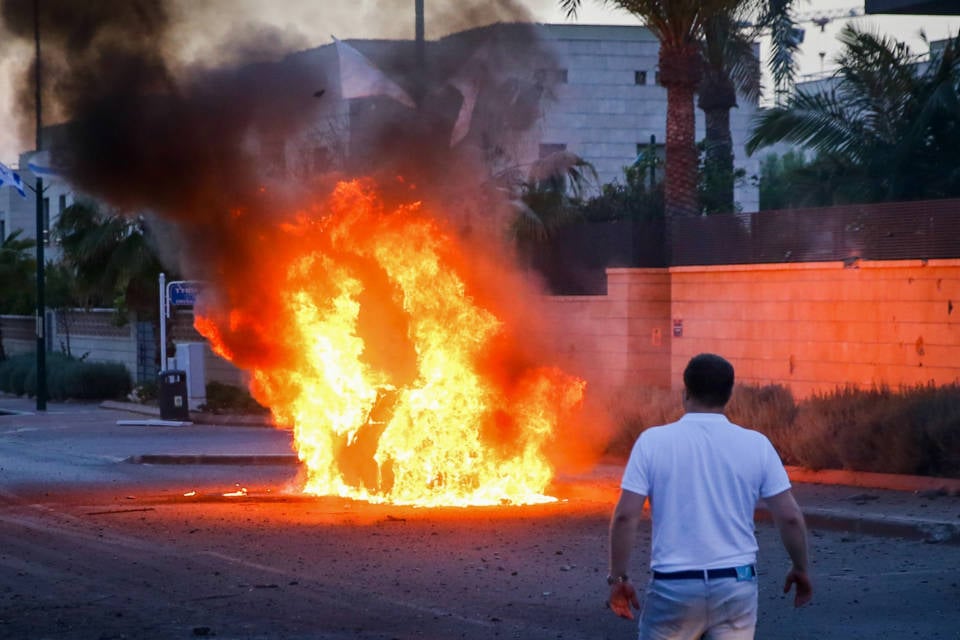“We are at war, and we will continue the war. We will continue until we achieve all our goals,” said Netanyahu.
By Joshua Marks, JNS
Israel will resume its war against Hamas following the conclusion of the hostage agreement reached with the terrorist group early Wednesday, according to a government statement.
“The Government of Israel, the IDF and the security services will continue the war in order to return home all of the hostages, complete the elimination of Hamas and ensure that there will be no new threat to the State of Israel from Gaza,” the statement read.
In his remarks at the start of Tuesday’s all-night Cabinet meeting, Prime Minister Benjamin Netanyahu called it a “difficult decision” but the “right” one.
“All the security forces fully support it. They made it clear in their full professional assessment that the security of our forces will be guaranteed during the days of the ceasefire and that the intelligence effort will be maintained [during] these days,” the premier said.
Netanyahu also emphasized that Israel would continue its military mission to topple Hamas in Gaza as soon as the ceasefire expires.
“We are at war, and we will continue the war,” Netanyahu said. “We will continue until we achieve all our goals.”
According to details released by the government on Wednesday, the agreement calls for Hamas to release 50 of the estimated 240 hostages it captured on Oct. 7 in exchange for a multi-day ceasefire. Women and children will be freed in groups of approximately 12 per day over four days, during which there will be a pause in fighting. An additional 10 hostages will then be released in return for each additional day of ceasefire, up to a maximum of 10 days.
The agreement also calls for Israel to release “up to” 150 security prisoners in exchange for the initial 50 hostages, plus more if additional hostages are freed. The government has published a list of 300 Palestinian prisoners and detainees who could be released as part of the deal, and the public will have the opportunity to appeal the release of specific prisoners over a period of 24 hours.
Out of the 300 prisoners, 287 are males aged 18 and under, most of whom were arrested for rioting, rock-throwing and other offenses in Judea and Samaria and eastern Jerusalem. The other 13 are adult women, most of them convicted of attempted stabbings.
Palestinians in eastern Jerusalem are preparing huge celebrations to welcome home the terrorists expected to be released from Israeli prisons in the coming days.
All 300 Palestinian prisoners will only be released on the condition that 100 Israeli hostages are freed.
“Immediately after the end of the pause in fighting needed to secure the release of the hostages, fighting will resume in the Gaza Strip in order to destroy the military and organizational capabilities of Hamas and Palestinian Islamic Jihad in Gaza and to create the conditions for the return of all the hostages,” the statement said.
Hamas took the hostages during its murderous assault on southern Israel on Oct. 7, during which thousands of heavily armed terrorists stormed across the Gaza border, murdering 1,200 people and wounding over 5,000 others.
Israeli President Isaac Herzog supported the government’s decision, though stating that he understood the reservations of its opponents.
“The reservations are understandable, painful and difficult, but given the circumstances I back and support the decision of the prime minister and the government to move forward with the deal to release hostages,” Herzog said on Wednesday.
“This is a moral and ethical duty that correctly expresses the Jewish and Israeli value of securing the freedom of those held captive, with the hope that it will be the first step in returning all the hostages home.
“The State of Israel, the IDF and all the security forces will continue to act in every way possible to achieve this goal, alongside the restoration of the absolute security of the citizens of Israel,” he continued.
While initially opposed to the deal, Israeli Finance Minister Bezalel Smotrich said on Wednesday that his Religious Zionism Party ultimately voted for it after being convinced that Israel would continue its mission to destroy Hamas in Gaza.
During the debate, it became clear to Smotrich that “repatriating hostages would advance the goals of the war and that the government, the cabinet and the entire defense establishment were unreservedly committed to continuing the war until the destruction of Hamas.”
Smotrich thanked the IDF for putting pressure on the terror group that created the conditions for the hostage deal, and vowed that the country’s political echelon would continue to support its efforts.
“We have no intention of stopping, on the contrary—the political echelon stands behind you, believes in you and is convinced that you will complete the job, destroy the Hamas Nazis in Gaza and restore security and national dignity to the citizens of Israel,” he said.
Israeli National Security Minister Itamar Ben-Gvir and his Otzma Yehudit Party opposed the deal, warning that freeing Palestinian terrorist could “bring disaster” and adding that fuel being allowed into the Strip might end up being used by Hamas to power its terror machine.
Opposition leader Yair Lapid said on Wednesday that his Yesh Atid Party supports the deal, tweeting that “the State of Israel has a supreme obligation to continue to work to return all the hostages home, until the last one.”
Terror victims’ group to appeal against hostage deal
The Almagor Terror Victims Association said that it will file a petition to the High Court of Justice on Wednesday against the government’s approval of the hostage deal.
In a letter to Israeli Justice Minister Yariv Levin, the organization demanded to see the list of prisoners Israel is considering releasing as part of the deal, which the Justice Ministry has publicized.
The group is also demanding to know what combat and intelligence-gathering restrictions will be part of the agreement. They also want to know about “the delivery of fuel and other supplies which may help Hamas conduct terror operations against residents of Israel.”
They are also demanding to know “the general commitments Israel is making to Hamas that have been given directly or through a third party.”
Israel at War with Hamas. Support Israel Today!
The people of Israel need your help at this most critical time. Please make a donation to help protect and defend Israelis against unprecedented Hamas terror.
Rockets are falling. Sirens blare, with seconds to run for cover. IDF soldiers risk their lives battling terrorists inside Gaza. Thousands forced to abandon their homes in southern Israel.
To fight terror and save lives, UWI provides bomb shelters, anti-terror vehicles, protective gear, security equipment, medical assistance, relief to victims and much more. Help Israel fight and win this war against Hamas. The time to act is now!




